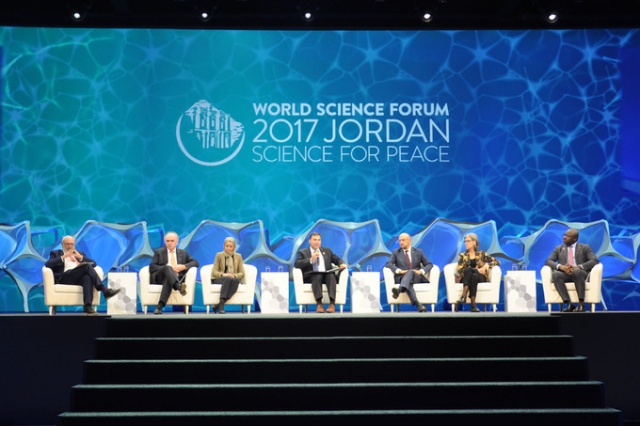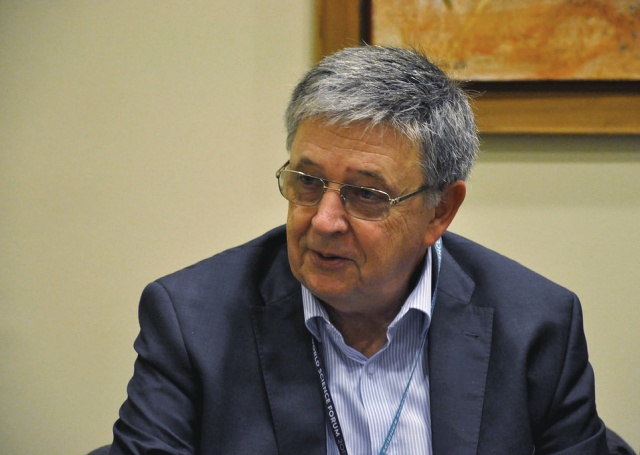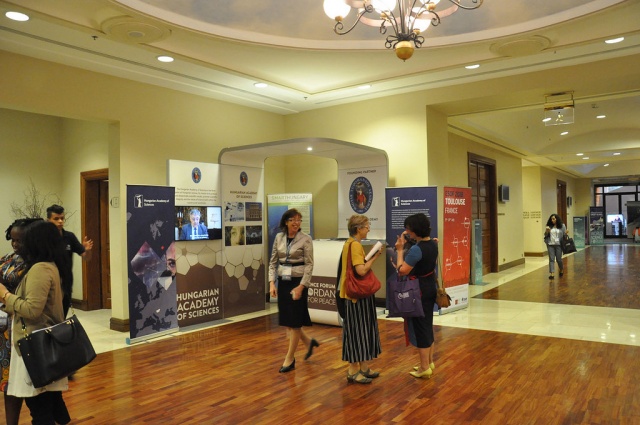Information bubbles must be popped – World Science Forum ends
This year’s World Science Forum in Jordan which ended characteristically with the adoption of a declaration was the eighth time that the Hungarian Academy of Sciences (MTA) together with seven international partners, including UNESCO, arranged this forum for scientists, academicians, science policy makers, politicians and businessmen. Following is an assessment of the event by László Lovász, President of the Academy.
17 November, 2017
How would you summarise the events of the World Science Forum? What is the greatest success of the conference for the Hungarian Academy of Sciences?
This year’s Forum was by far the largest in the hiPlease click here to see our gallery of the event.story of the conference. The number of participants – almost 3,000 – was three times as many than we hosted as guests in Budapest in 2015. We had approximately 900 guests two years ago. Clearly, this has a political message: this fact is a recognition of the moderate political system in Jordan. It is worth noting that only about one-third of the participants came from the Arab world. Thus, this event was seen as an opportunity to get into the flow of the scientific world – not only for Arab countries, but for all developing countries.
The Hungarian Academy of Sciences contributed to this success significantly. I am thinking about the work of our organisers from early years, as we have been able to witness a steady growth in the number of participants from the beginning of the 21st century. At the same time, this growth in numbers was unprecedented. We are very happy to see the success of this event. In addition, this is also a great challenge for the future, as the next World Science Forum in 2019 will be hosted by Budapest again. There is no doubt now that we managed to launch a highly successful event in 2003.
 The closing ceremony was attended by HRH Sumaya bint El Hassan, President of the Royal Scientific Society of Jordan, Prince El Hassan bin Talal and Carlos Moedas, European Commissioner for Research, Science and Innovation mta.hu/Soma Rédey
The closing ceremony was attended by HRH Sumaya bint El Hassan, President of the Royal Scientific Society of Jordan, Prince El Hassan bin Talal and Carlos Moedas, European Commissioner for Research, Science and Innovation mta.hu/Soma Rédey From the beginning of the opening ceremony, through several other events, to the prize-giving ceremonies, all of the speakers expressed their distinguished gratitude to the Hungarian Academy of Sciences, all witnessed by leading science diplomatic delegations. Can we claim that one of the most important benefits of the World Science Forum for Hungary is that it has heightened the reputation of Hungarian science diplomacy?
One of the priority aims of the Hungarian Academy of Sciences is to be present on the international scientific stage, that is, to play a significant role in the international scientific community and science diplomacy. This event serves such purposes especially well. It is of primary importance to show Hungary’s significant scientific potential. Our other aim is to build relationships. János Áder, President of Hungary, also attended this forum on the shores of the Dead Sea, and he also delivered a speech at the opening ceremony. This fact alone provided weight to this event. Although we are in contact with many countries in the scientific world, this conference helped make our relationship with Jordan even stronger.
The Jordanian royal family and consequently, the whole of Jordan’s science policy makers regard science as the best way to attain prosperity. They often declare that as Jordan is a country short of natural resources and agriculture is also in a rather difficult situation, the only possible path is through supporting human capacity. They wish to achieve this goal through science. It is very important for us to have good relations with a country with such a disposition.
 Academy president László Lovász speaking to mta.hu at the WSF 2017 mta.hu/Soma Rédey
Academy president László Lovász speaking to mta.hu at the WSF 2017 mta.hu/Soma Rédey One thematic meeting featured the question of scientific advice. To what extent does science reach decision makers? How can a conference like WSF facilitate this process?
In the speech I delivered in this section, I highlighted the idea that it is not only decision makers and politicians who must get advice, but we should also inform the wider public – as they are the ones who suffer from bad decisions. And politics by definition is under constant pressure from the public. If the public cannot be convinced of something, it will also be difficult to convince politicians. Guided by this objective, the Hungarian Academy of Sciences devotes a lot of energy to informing the public.
Furthermoe, in my speech I listed some problems which the Academy should be consulted with. These are primarily questions which are in the scope of public debate. In some cases these questions are also debated by scientists, while in other cases there is a consensus. Questions debated by both the public and scientists include the enlargement of the Paks nuclear power station in Hungary or the utilisation of water power. Conversely, theories around the Earth being flat or homeopathy are not debated by scientists, but we must address these problems, as the public is interested.
An important topic from the panel discussions was the problem of pseudo-sciences and alternative facts. Very important insights were presented about the methods through which they can be fought and the challenges we face owing to the increasing number of communication channels. Several participants mentioned that social media might produce information bubbles in which people are only presented with information from those who think the same way as them. Concerning the topic of communicating science, we must find ways to pop such bubbles.
 The information booth of the Academy at the 8th World Science Forum at the King Hussein Bin Talal Convention Centre by the Dead Sea mta.hu/Soma Rédey
The information booth of the Academy at the 8th World Science Forum at the King Hussein Bin Talal Convention Centre by the Dead Sea mta.hu/Soma Rédey The motto of this conference was “Science for Peace”. How would you comment on this message based on your experiences?
I found that the climate among scientists and science diplomats is much more human than in politics in general. One side of the “Science for Peace” motto is that scientific research and scientific results are indispensable for preventing the world from going down the road which leads to war and famine. We must pay attention to several factors, from the protection of the environment to resource management. Science might be able to reduce or eliminate these negative processes.
Moreover, science can also provide perspective to people working in science, and thus we can work on addressing common challenges. Please click here to read the declaration of the 8th World Science ForumTherefore, we can put aside political and religious differences, and maybe even individual interests. We will try to work together for enriching human knowledge. Several examples were mentioned in the lectures. For me this is the primary meaning and message of “Science for Peace”.
In his speech at the closing ceremony, László Lovász announced that the 20th anniversary of the foundation of WSF will be celebrated in Budapest in 2019. He thinks the next forum will provide an excellent opportunity to discuss the hottest topics in the world scientific community. These include balancing research freedom and ethics, cooperation between researchers from social and natural sciences, the publication crisis and the intellectual property rights of state-financed research.
The World Science Forum is the only meeting in the world where the representatives of science can discuss problems with decision makers based on complex criteria. The event was organised jointly by the Hungarian Academy of Sciences and seven partner organisations: the United Nations Educational; Scientific and Cultural Organization (UNESCO); the International Council for Science (ICSU); the American Association for the Advancement of Science (AAAS); The World Academy of Sciences (TWAS); the European Academies Science Advisory Council (EASAC), the InterAcademy Partnership (IAP), representing academies of science all over the world; and the International Social Science Council (ISSC). The host organisation in Jordan was the Royal Scientific Society. The patrons of the event were His Majesty King Abdullah II Ibn Al Hussein of the Hashimite Kingdom of Jordan, János Áder, President of Hungary, and Irina Bokova, Director General of UNESCO.
